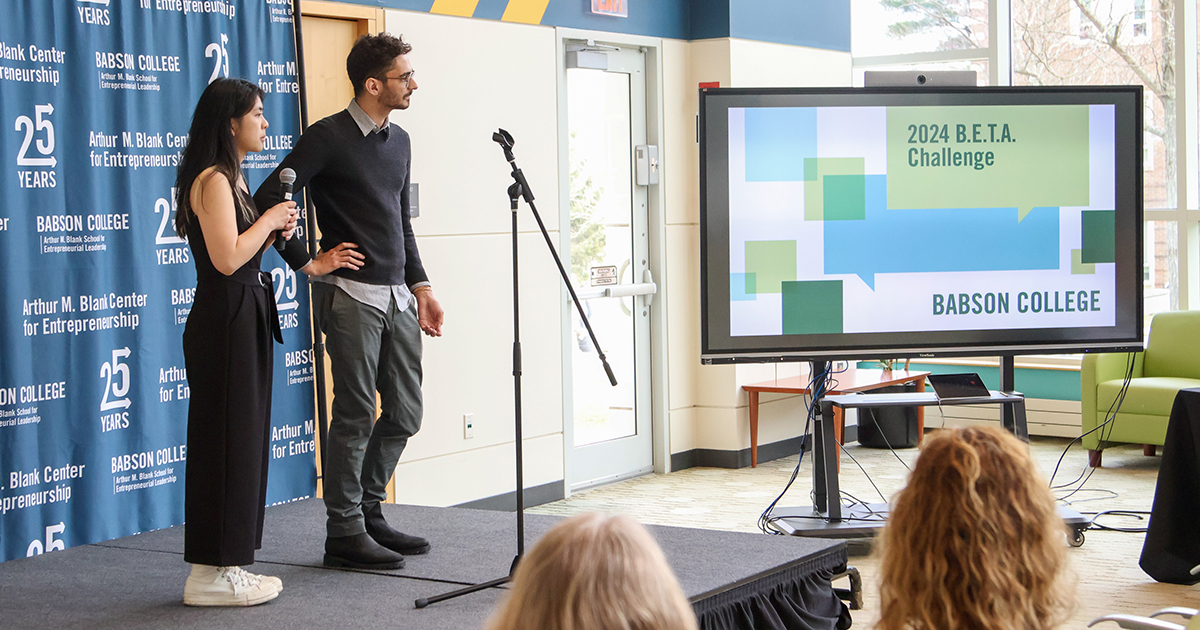What’s in a Name? The Stories Behind This Year’s B.E.T.A. Challenge Semifinalists

Choosing the right name for a venture is more than just a creative exercise—it’s a defining moment that encapsulates a brand’s story, values, and vision. Some names honor family legacies, carrying generations of tradition. Others capture a mission, a passion, or a light bulb moment of inspiration. And sometimes, a name evolves, shaped by unexpected challenges and the journey of building a business.
For these Babson entrepreneurs, naming their ventures was just the beginning. Now, they’re putting their businesses to the test in this year’s B.E.T.A. (Babson Entrepreneurial Thought & Action®) Challenge presented by the Arthur M. Blank Center for Entrepreneurship. They’ll compete for funding, expert advice and feedback, and the chance to take their ventures to the next level. On April 16, 18 semifinalists will pitch their startups, each business representing months—or even years—of hard work and vision. Nine finalists representing the three tracks (undergraduate, graduate, and alumni) will progress and compete in the final showdown for more than $150,000 in cash prizes.
B.E.T.A. Challenge: Register to attend the semifinals April 16 and the final April 17 at Olin Hall.
As the entrepreneurs prepare for the B.E.T.A. Challenge, we take a closer look at some of the stories behind their venture names—what they mean, why they matter, and how they set the stage for success.
Titin
Daniel Danes Valenzuela MBA’24 credits his wife for the name Titin, which honors his family’s rich history of crafting olive oil. Inspired by the nickname of his great-grandmother, grandmother, and mother, all named Matilde, who are leaders in the family business in Jaén, Spain. The name reflects their deep cultural roots and dedication to tradition.
Have you ever thought about changing your name, or has it evolved since you first started?
“I have considered it because Titin isn’t the most straightforward name to pronounce in the U.S,” Valenzuela said. “Still, I’ve resisted changing it because it represents a family legacy of more than a hundred years of crafting olive oil, and it’s tied to the story of three women in my family.”
Joiia
Joiia was born from a personal moment of gratitude and a desire to give back. Founder Sabrina Eng ’25 was inspired by the compassion shown to their mother during a critical health scare, and wanted to create scrubs that uplift healthcare workers both physically and emotionally. Joiia is derived from Portuguese, where joia means “jewel.” It was also inspired by the Italian word gioia, meaning “joy” but was adapted to Joiia for clarity and accessibility. The final version—Joiia, with the double “i”—retains the original meaning while adding a visual warmth: the double “i” resembles a pair of eyes, symbolizing attentiveness and care.
What advice would you give to other entrepreneurs struggling to find the perfect name?
“Finding the perfect name can be a journey, and it’s OK if it takes time,” Eng said. “My advice is to focus on what your business stands for and the emotions you want to evoke.”
BUDget
Gabby Lopes ’28 drew inspiration for the name BUDget from her desire to make personal finance education engaging for young students. A fan of puns, Gabby fused “budgeting” with “Bud,” symbolizing both the concept of saving and a friendly financial advisor. The name not only reflects the game’s focus on teaching financial literacy but also introduces “Bud,” a teal robot avatar that has become the face of the brand. As the company has grown, the name has evolved into a key part of its identity, emphasizing fun and accessible financial education for kids.
What advice would you give to other entrepreneurs struggling to find the perfect name?
“Let it come naturally! I was sitting in a classroom bouncing ideas off of my co-founder, and naturally found a pun that worked in the long run,” Lopes said. “There is no other way to explain it, except for a literal light bulb going off in my head.”
KYN
KYN was born from both cultural heritage and brand identity. Founder Ily Coulibaly MSBA’25 drew inspiration from her traditional African name, Kynion, which means “perfection” in Tagbana—a reflection of the high standards they set for her skincare company. The name also carries a subtle industry connection, as its pronunciation echoes “skin,” making it both personal and relevant. This blend of meaning, simplicity, and memorability made KYN the perfect fit for the brand.
Did you face any challenges in securing a domain name, trademark, or social media handles for your brand? How did you overcome them?
“Securing a digital presence for KYN was challenging due to the brevity of the name,” Coulibaly said. “To overcome this, we have added relevant words to the original name, resulting in handles like @kyn_care on Instagram/TikTok and kyn-care.com for our website. This approach ensured availability across platforms and highlighted our focus on skincare, helping establish a cohesive identity online.”
Wright One
Wright One was inspired by the Wright brothers, whose pioneering flight efforts shaped aviation history. Founder Justin McAfee MBA’21 initially named his company WrightFlight when applying to Babson’s MBA program, but as the business evolved, he changed it to Wright One to allow for broader opportunities. The final name emerged when legal restrictions led to the playful addition of One, inspired by childhood screen names. Today, the name reflects the company’s growth and adaptability, while also honoring their work in developing sustainable electric turbine technology for aviation.
Have you ever thought about changing your name, or has it evolved since you first started?
“At the beginning I was pretty upset about the name change, but over time people started giving me ideas about how to brand the company moving forward,” McAfee said. “And now whenever I’m delivering a product pitch, or a keynote discussing the product’s capabilities, I am always adding little dad jokes—therefore we are the Wright One with the Wright Fan!”



